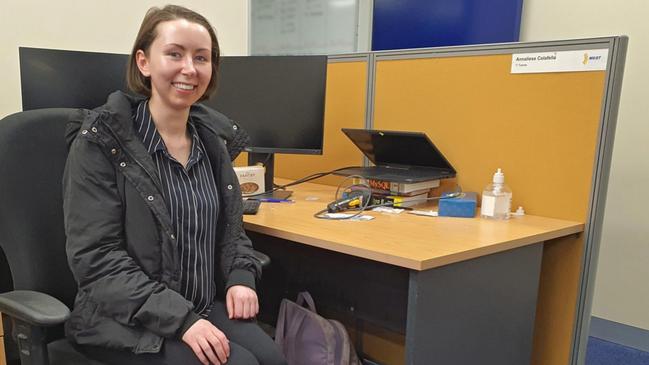Why you should consider more than money when switching jobs
Workers stand to lose $1 million in the longer term if they make this one big strategic error, experts warn.
Careers
Don't miss out on the headlines from Careers. Followed categories will be added to My News.
It takes less than $5000 to convince many Aussie workers to switch jobs, new research shows.
As living costs continue to soar, almost a third of workers who moved jobs in the past year did so for a pay increase of $5000 or less, a survey by RMIT Online reveals.
Sixty-one per cent of Australians changed jobs for less than $10,000, the research shows.
But employment expert Roxanne Calder says workers should not make their decision based on money alone, warning a small pay increase now could deprive them of much more in the future.
The million-dollar mistake
Workers stand to lose a million dollars in the longer term if they move to the wrong job, says Calder, the founder of recruitment agency Est10.
She says roles without clear strategies for career progression mean further pay rises are unlikely and warns that unhappy workers will find it difficult to move elsewhere.
“It’s not as easy as saying you will just find another job (if the new role doesn’t work out),’’ Calder says.
“If you make the wrong career move, your self-esteem goes, you start to accumulate baggage, your skill sets are not improving – in fact, you’re actually going backwards. And when you do go back into the jobs market, you’re not the same calibre of candidate that you were 12 months ago.
“That sort of mistake, over a lifetime, could be a million-dollar mistake, when what you should have done initially is stay where you are, or made a better choice and perhaps gone with the job that offered $5000 (and better development opportunities) instead of the one that offered $10,000, so that your career isn’t (negatively) impacted.”
Fooled by flattery
Calder says headhunting, which has reached unprecedented levels, has led many workers to change jobs without good reason.
“If you’re not used to a headhunting call, it can go straight to your ego,” she says.
“People are flattered but they don’t know what to do with it … they start making things up to justify why they need to change jobs and suddenly they don’t like their manager, even though they didn’t have a problem with them last week (before the recruitment approach was made).”
RMIT Online interim chief executive officer Claire Hopkins says the cost of living is creating a “sense of urgency” to find roles with a better pay cheque but believes workers are also taking other factors into account.
“Remuneration will absolutely be a factor for employees when it comes to making a career move or their overall satisfaction but it typically won’t be the only consideration,” she says.
“Finding a workplace that aligns to personal values and invests in its staff – whether through formal qualifications or on-the-job training – are the biggest considerations when making a switch.”
Prospects are a priority
Having just started her IT career, future job prospects and training opportunities are more important than money for Annaliese Colafella.
Colafella graduated from the Microsoft Traineeship program last year, obtaining qualifications in information technology.
She has since secured a full-time role with MEGT’s IT department, where she works as a service desk analyst.
“There are definitely opportunities for me to grow (at MEGT) and that was a big part of why I wanted to work here,’’ says Colafella, who dropped out of a Bachelor of Biomedical Science to pursue her passion for IT.

“I didn’t want to be completely stagnating in a role, I wanted to go somewhere where I knew there was an opportunity for me to grow and advance my career.”
MEGT partners with Microsoft to run the traineeship program. The apprenticeship provider also served as Colafella’s host employer throughout her training, giving her the opportunity to see first-hand the development opportunities it provides for its staff.
“It’s just a fantastic place to work,” she says. “They encourage you to get further certificates (qualifications) and things like that to broaden your skills, which was a big thing for me (in accepting the current role).”
Colafella says while salary did play a part in accepting her current role, it wasn’t the only consideration.
“It’s the job prospects and other factors that definitely played a significant role in my decision making,” she says.
Originally published as Why you should consider more than money when switching jobs




